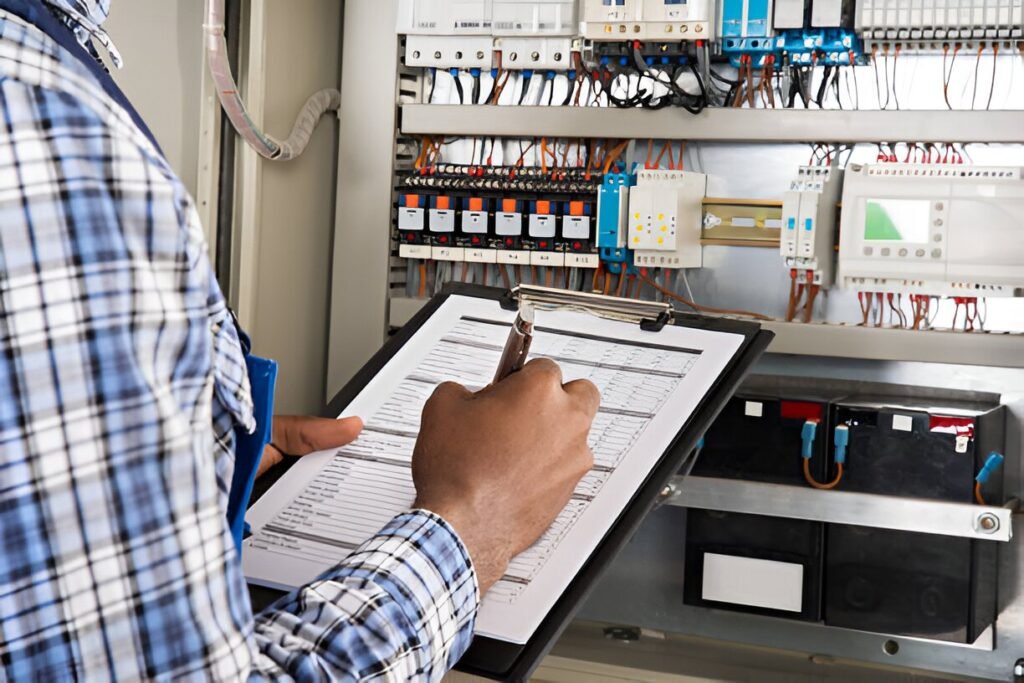Just as a lighthouse guides sailors safely to shore, an Electrical Safety Certificate, or more formally known as the Electrical Installation Condition Report (EICR), serves as a beacon of safety for landlords and tenants alike.

As a landlord myself, I’ve found it’s not only legally mandated but also an invaluable tool in preventing electrical hazards. But what does the process of obtaining one involve, and how does it impact you as a landlord?
Does a landlord have to have an electrical safety certificate? Let’s embark on this journey to explore the intricacies and implications of the EICR.
Table of Content
Understanding EICR Requirement
In order to fully comprehend the EICR requirement, it’s important to know that an Electrical Installation Condition Report (EICR) is a legal necessity for all private landlords in the rental sector. Understanding regulations surrounding this requirement is vital.
EICR is a detailed examination of a property’s electrical systems and installations, assessing their safety standards. The inspection process involves a qualified electrician checking for damage, testing circuits, and identifying any electrical risks.
Compliance requirements mandate that this report be up to date, with inspections conducted every five years or less, depending on the property. As part of their landlord obligations, property owners must ensure these inspections take place and any identified faults are promptly rectified to maintain the safety of their tenants.
Importance of EICR for Landlords
Ensuring the safety of tenants, the Electrical Installation Condition Report (EICR) serves a crucial role for landlords in the private rented sector. Landlord electrical safety in London is a key focus, making the EICR a preventive measure that is paramount in maintaining compliance standards and providing safety assurance for both parties involved.
Does a landlord have to have an electrical safety certificate? Acquiring an EICR isn’t merely about ticking a box; it’s about securing tenant protection from potential electrical hazards, which can lead to catastrophic consequences. Additionally, a legitimate EICR can enhance your property value, demonstrating to potential buyers or renters that the property is well-maintained and safe.
Therefore, as a responsible landlord, prioritizing EICR ensures you’re not only adhering to necessary regulations but also safeguarding your investment while ensuring the well-being of your tenants.
EICR Inspection Process
As a vital part of maintaining safety standards, the EICR inspection process involves a thorough examination of the property’s electrical installations by certified electricians. This property inspection is crucial to ensure electrical testing is up to par, guaranteeing tenant safeguards.

The process begins with a visual evaluation of the electrical systems, checking for any visible signs of wear and tear or damage. Next, the electrician conducts a series of tests on the circuits and systems to ensure they’re functioning correctly and safely.
Any discrepancies or faults found during the inspection are noted, categorized based on their severity, and included in the final EICR report. This comprehensive process ensures that the property adheres to the highest safety standards.
Procedure for Obtaining EICR
To secure an Electrical Installation Condition Report (EICR), landlords must adhere to a defined procedure that starts with hiring a licensed electrician. This professional is responsible for conducting a thorough examination of the property’s electrical system, which is especially important when considering commercial EICR requirements. Does a landlord have to have an electrical safety certificate? Cost considerations come into play at this stage, as the complexity of the electrical system can influence the electrician’s fees. However, legal compliance and safety assurance should be prioritized over cost.
The inspection process is a critical aspect of electrical maintenance designed to detect any potential issues that could compromise the property’s safety. Upon completion, the electrician provides an EICR, validating the electrical system’s condition. Obtaining an EICR not only ensures compliance with safety standards but can also contribute to maintaining, if not enhancing, the property’s value.
Benefits and Considerations
When it comes to the benefits of obtaining an Electrical Safety Certificate, landlords can expect several advantages beyond compliance with safety regulations.

The safety benefits are paramount; you’re ensuring your property is free from electrical hazards, which provides tenant assurance and reduces the risk of accidents.
It’s also a compliance advantage, keeping you aligned with legal requirements.
Next, consider the property value. An up-to-date certificate can significantly enhance your property’s appeal to potential tenants or buyers.
When it comes to cost considerations, it’s worth noting that the price of an inspection is a small investment compared to the potential costs of electrical repairs or legal issues down the line.
Ultimately, the benefits far outweigh the costs.
Landlord Responsibilities and Actions
Navigating through their responsibilities, landlords must proactively book inspection and testing appointments to ensure the safety of their property’s electrical installations.
As a landlord, it’s crucial that I engage only qualified electricians for these services, ensuring the highest standards of safety for my tenants.
I also make a point to keep organized inspection records, as this helps demonstrate compliance with safety regulations, also serving as a valuable resource for future reference.
Additionally, providing tenants with comprehensive safety information isn’t just a legal obligation – it’s part of my commitment to ensuring their wellbeing.
Frequently Asked Questions
What Happens if a Landlord Fails to Obtain an Electrical Safety Certificate?
If I, as a landlord, fail to obtain an electrical safety certificate, I’d risk legal penalties. This includes potential fines, an inability to evict tenants, and bearing all certificate costs for overdue renewals.
How Can a Landlord Find a Qualified Electrician to Perform the EICR Inspection?
I’d recommend checking an electrician’s certifications, asking about their EICR cost, understanding their inspection frequency, and negotiating rates. Always ensure they’re qualified for EICR inspections to maintain electrical safety in your rental property.
What Are the Potential Penalties for Not Complying With the EICR Requirements?
As a landlord, not complying with EICR requirements could lead to severe penalties, impacting tenant’s legal rights. It’s crucial to understand the regulatory body’s role and importance of safety certificate for penalty avoidance strategies.
How Does a Landlord Handle Remedial Work That Is Recommended in the EICR Report?
As a landlord, I’m responsible for any remedial work recommended in the EICR report. I must cover the costs, adhere to repair timelines, and ensure safety measures are taken, considering insurance implications and tenant responsibilities.
Are There Any Exceptions or Special Conditions Where a Landlord Might Not Need an Electrical Safety Certificate?
Yes, there are exceptions. As a landlord, I don’t need an electrical safety certificate for lodgers or for properties with long leases. However, bypassing this requirement may have insurance implications and pose safety considerations.
Conclusion
In conclusion, as a landlord, complying with the EICR requirement isn’t just about meeting legal obligations. It’s about ensuring the safety of your tenants and enhancing the value of your property.
Remember, an EICR isn’t a mere formality, but a critical aspect of your responsibility as a landlord.
Stay informed, stay compliant, and create a safe and profitable environment for both you and your tenants.


